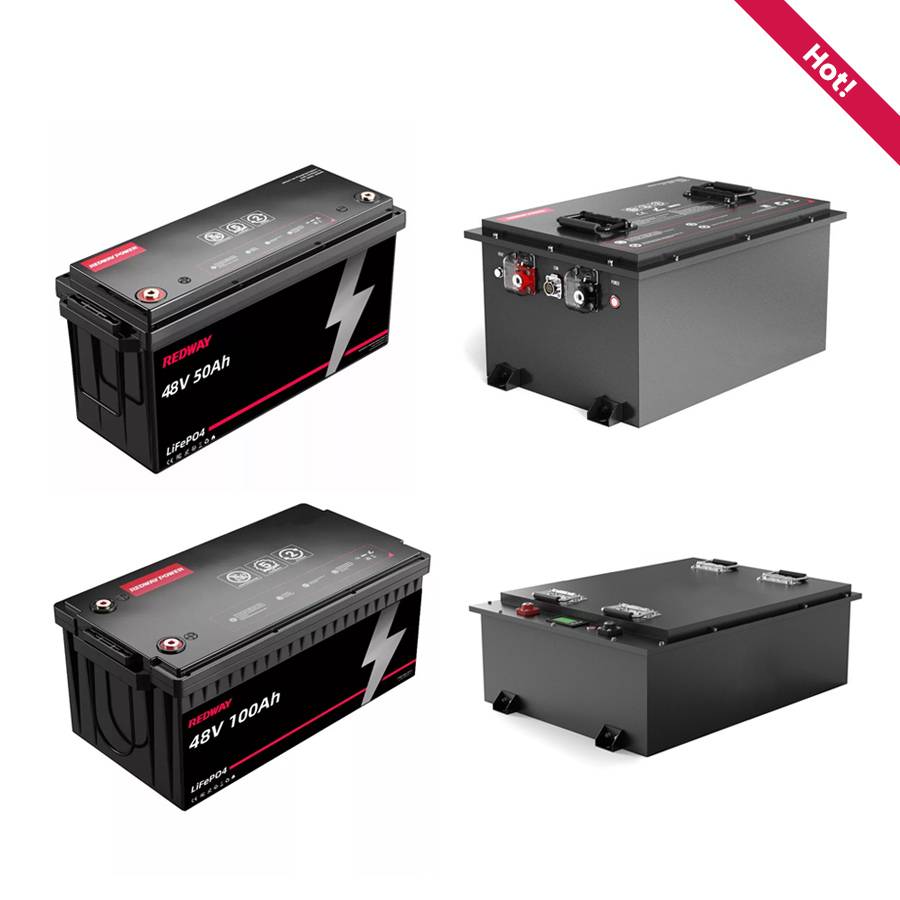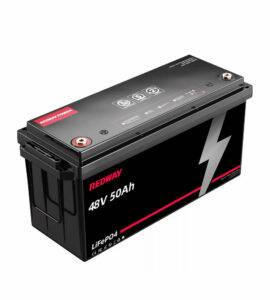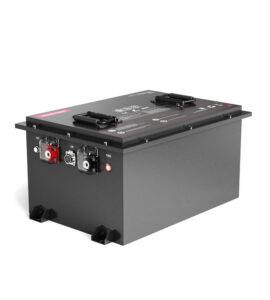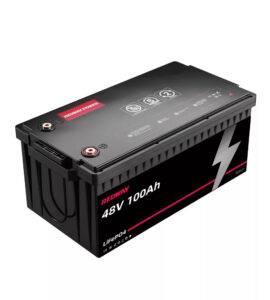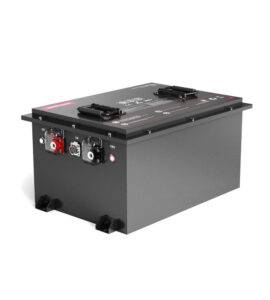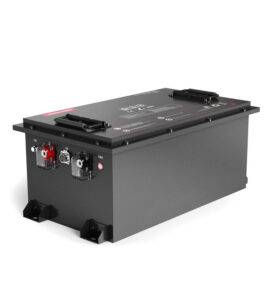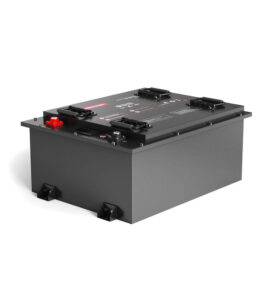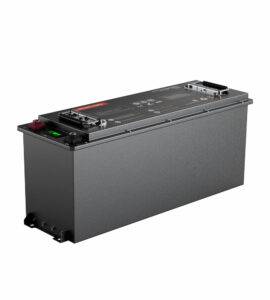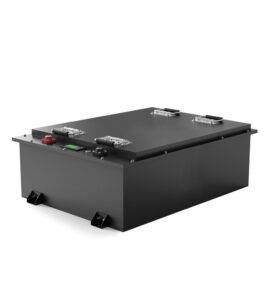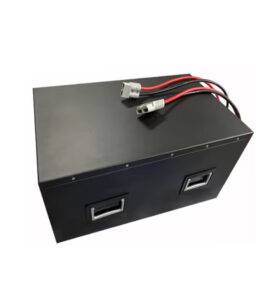- Forklift Lithium Battery
-
48V
- 48V 210Ah
- 48V 300Ah
- 48V 420Ah (949 x 349 x 569 mm)
- 48V 420Ah (950 x 421 x 450 mm)
- 48V 456Ah
- 48V 460Ah (830 x 630 x 590 mm)
- 48V 460Ah (950 x 421 x 450 mm)
- 48V 460Ah (800 x 630 x 600 mm)
- 48V 460Ah (820 x 660 x 470 mm)
- 48V 500Ah
- 48V 560Ah (810 x 630 x 600 mm)
- 48V 560Ah (950 x 592 x 450 mm)
- 48V 600Ah
- 48V 630Ah
-
48V
- Lithium Golf Cart Battery
- 12V Lithium Battery
12V 150Ah Lithium RV Battery
Bluetooth App | BCI Group 31
LiFePO4 Lithium
Discharge Temperature -20°C ~ 65°C
Fast Charger 14.6V 50A
Solar MPPT Charging - 24V Lithium Battery
- 36V Lithium Battery
- 48V Lithium Battery
-
48V LiFePO4 Battery
- 48V 50Ah
- 48V 50Ah (for Golf Carts)
- 48V 60Ah (8D)
- 48V 100Ah (8D)
- 48V 100Ah
- 48V 100Ah (Discharge 100A for Golf Carts)
- 48V 100Ah (Discharge 150A for Golf Carts)
- 48V 100Ah (Discharge 200A for Golf Carts)
- 48V 150Ah (for Golf Carts)
- 48V 160Ah (Discharge 100A for Golf Carts)
- 48V 160Ah (Discharge 160A for Golf Carts)
-
48V LiFePO4 Battery
- 60V Lithium Battery
-
60V LiFePO4 Battery
- 60V 20Ah
- 60V 30Ah
- 60V 50Ah
- 60V 50Ah (Small Size / Side Terminal)
- 60V 100Ah (for Electric Motocycle, Electric Scooter, LSV, AGV)
- 60V 100Ah (for Forklift, AGV, Electric Scooter, Sweeper)
- 60V 150Ah (E-Motocycle / E-Scooter / E-Tricycle / Tour LSV)
- 60V 200Ah (for Forklift, AGV, Electric Scooter, Sweeper)
-
60V LiFePO4 Battery
- 72V~96V Lithium Battery
- Rack-mounted Lithium Battery
- E-Bike Battery
- All-in-One Home-ESS
- Wall-mount Battery ESS
-
Home-ESS Lithium Battery PowerWall
- 24V 100Ah 2.4kWh PW24100-S PowerWall
- 48V 50Ah 2.4kWh PW4850-S PowerWall
- 48V 50Ah 2.56kWh PW5150-S PowerWall
- 48V 100Ah 5.12kWh PW51100-F PowerWall (IP65)
- 48V 100Ah 5.12kWh PW51100-S PowerWall
- 48V 100Ah 5.12kWh PW51100-H PowerWall
- 48V 200Ah 10kWh PW51200-H PowerWall
- 48V 300Ah 15kWh PW51300-H PowerWall
PowerWall 51.2V 100Ah LiFePO4 Lithium Battery
Highly popular in Asia and Eastern Europe.
CE Certification | Home-ESS -
Home-ESS Lithium Battery PowerWall
- Portable Power Stations
We accept OEM, ODM and SKD orders
48V Lithium ion Battery Factory Wholesale
Redway Power
48V Lithium ion Battery, One-Stop Solution
Redway Power 48V Lithium-ion Batteries, your ultimate one-stop solution for flashlight power needs. Engineered for reliability, our rechargeable batteries boast high energy density and a lightweight build. From the compact 48V 50Ah to the robust 48V 200Ah, our range caters to varied needs.
Whether you're a professional or a consumer, our batteries ensure dependable performance for outdoor adventures, emergencies, and professional tasks. Trust Redway Power for unparalleled convenience and reliability in powering your devices. Illuminate your world with confidence, knowing you have the backing of Redway Power's advanced lithium battery technology.
Redway Power for Lithium Batteries OEM/ODM
Best 48V Lithium ion Battery Manufacturer 2024
48V Lithium ion Battery Wholesale
Wholesale 48V lithium-ion batteries offer high energy density, fast charging, and long-lasting performance. These batteries are available in various capacities, providing reliable power for a wide range of applications. Consider reputable suppliers that offer customizable options, high-quality cells, and competitive pricing for your wholesale needs.
What is the wholesale price of lithium battery?
You can click contact us or phone call us. We will give you multiple options of price.
Is Redway Power a trading company or factory?
Redway Power is a company with its own factory, integrating research, development, production, and sales.
How about the quality of Redway's LiFePo4 Battery product?
Redway Power boasts over 12 years of experience in LiFePO4 battery production and is an authorized supplier for CATL and BYD.
Can you do an OEM/ODM project?
Yes, we have engineers available to assist in designing and developing any related products.
What’s your MOQ?
MOQ varies according to battery voltage and capacity.
What payment terms can we accept?
We accept TT/Paypal/West Union, etc.
48V Lithium ion Battery Knowledge
Discover the power and versatility of 48V lithium-ion batteries. Composed of multiple lithium-ion cells, these rechargeable batteries provide a voltage of 48 volts. With their high energy density, long lifespan, and wide range of applications, they are ideal for powering electric vehicles, solar energy storage, and UPS systems. Experience the efficient and reliable performance of 48V lithium-ion batteries.
What is the Lifespan of a 48V Lithium-ion Battery Compared to Others?
Lithium-ion batteries, including the 48V variety, outlast traditional lead-acid batteries. Typically lasting 10-15 years with proper care, they offer superior longevity compared to lead-acid batteries, which usually endure 3-12 years. Factors like discharge depth, temperature, and charging habits influence their lifespan. Adhering to maintenance guidelines ensures optimal performance and durability.
How Do I Safely Handle and Charge 48V Lithium-ion Batteries?
To safely handle and charge 48V lithium-ion batteries, follow these guidelines: 1) Ensure a dry, clean, and well-ventilated workspace. 2) Connect the battery properly and avoid overcharging. 3) Monitor the battery’s temperature and charging progress. 4) Wear appropriate protective gear when handling batteries. Remember to follow manufacturer instructions and consult professionals if needed.
- Workspace and Environment: Ensure that the workspace is dry, clean, and well-ventilated to minimize any potential hazards. This promotes safety and reduces the risk of accidents.
- Proper Connection and Charging: Connect the battery correctly and avoid overcharging, as it can negatively impact the battery’s performance and lifespan. Following manufacturer instructions is essential for the safe and efficient charging of lithium-ion batteries.
- Monitoring and Protection: Monitor the battery’s temperature and charging progress to prevent any issues or potential safety risks. Wearing appropriate protective gear, such as gloves and eye protection, is important when handling lithium-ion batteries.
By adhering to safety guidelines, such as maintaining a suitable workspace, ensuring proper connection and charging, monitoring the battery, and using protective gear, you can handle and charge 48V lithium-ion batteries safely. Always refer to manufacturer instructions and seek professional assistance when needed to ensure the proper handling and charging of these batteries.
Can I Swap 48V Lithium-ion Batteries with Other 48V Types?
Yes. For a safe swap of 48V lithium-ion batteries, ensure voltage, size, and safety match. Check if the replacement battery meets the 48V requirement and fits in the space. Confirm it has safety features like overcharge protection. Follow manufacturer guidelines for a smooth transition. Seek professional advice if unsure.
Swapping 48V lithium-ion batteries requires careful consideration to ensure compatibility and safety:
Voltage Match:
- Ensure the replacement battery matches the 48V requirement to power your device effectively.
Size and Fit:
- Check the dimensions to ensure the new battery fits your device’s available space properly.
Safety Features:
- Look for safety features like overcharge protection to prevent potential hazards during operation.
Always consult manufacturer guidelines for a smooth transition and seek professional advice if needed.
Why Choose 48V Lithium-ion Over Traditional Lead-acid Batteries?
Choosing a 48V lithium-ion battery over traditional lead-acid batteries offers several advantages. Lithium-ion batteries provide higher discharge rates, longer life spans, and reduced weight compared to lead-acid batteries. These benefits make them a preferred choice for various applications, including electric vehicles, renewable energy systems, and off-grid power solutions.
- Higher Discharge Rates: 48V lithium-ion batteries offer higher discharge rates, allowing for more efficient power delivery when needed. This makes them suitable for applications that require quick bursts of energy.
- Longer Life Spans: Lithium-ion batteries have longer life spans compared to lead-acid batteries. They can withstand a higher number of charge cycles, providing reliable performance over an extended period.
- Reduced Weight: Lithium-ion batteries are significantly lighter than lead-acid batteries. This weight reduction is beneficial for applications that require portability or where weight considerations are essential.
Opting for 48V lithium-ion batteries over traditional lead-acid batteries brings advantages such as higher discharge rates, longer life spans, and reduced weight. These benefits make lithium-ion batteries a preferred choice for various applications, including electric vehicles, renewable energy systems, and off-grid power solutions.
How Should I Store 48V Lithium-ion Batteries to Maintain Performance?
To maintain optimal performance of your 48V lithium-ion batteries, store them at 50% capacity to prevent overcharging or over-discharging. Charge to 50% capacity every six months for battery health. Remove batteries from devices for storage to prevent drain. Keep them stored between 5°C (41°F) and 20°C (68°F) to preserve performance.
Here are some simple steps to store your 48V lithium-ion batteries for optimal performance:
1. **Charge Level**: Before storage, make sure your battery is at about 50% capacity. This prevents overcharging or over-discharging, which can damage the battery over time.
2. **Regular Use**: Even if you’re not using your battery regularly, it’s essential to charge it to 50% every six months. This helps keep the battery healthy and maintains its performance.
3. **Separation**: When storing your battery, remove it from any devices it’s connected to. This prevents any energy drain and ensures the battery stays in good condition.
4. **Temperature**: Store your battery in a cool, dry place with temperatures between 5°C (41°F) and 20°C (68°F). Avoid extreme temperatures, as they can affect the battery’s performance.
By following these simple guidelines, you can keep your 48V lithium-ion batteries ready for use whenever you need them!
Are There Maintenance Steps to Extend the Lifespan of 48V Lithium-ion Batteries?
Yes. To make 48V lithium-ion batteries last longer, follow these steps: Avoid extreme temperatures, charge within recommended ranges, and minimize full charges and discharges. Aim for 40-60% charge for storage and recharge every six months. Store batteries at around 50% capacity and between 5°C to 20°C. These practices help maintain battery efficiency and durability.
To ensure your 48V lithium-ion batteries last longer, follow these simple maintenance steps:
1. Temperature Control:
- Keep batteries away from extreme temperatures.
- Store them between 15°C to 25°C (59°F to 77°F).
- Charge within specified temperature ranges for optimal performance.
2. State of Charge (SoC):
- Limit time spent at full charge or discharge.
- Aim for 40% to 60% SoC for storage.
- Recharge to 50% capacity every six months.
3. Storage Practices:
- Maintain batteries at around 50% capacity for storage.
- Recharge every six months to prevent degradation.
- Store between 5°C to 20°C (41°F to 68°F).
Following these steps helps ensure your batteries remain efficient and durable over time.
What is the Typical Charging Time for a 48V Lithium-ion Battery?
When charging a 48V lithium-ion battery, several factors affect the time it takes to fully charge. These include the battery’s capacity, the current used for charging, the efficiency of the charger, and the battery’s current state of charge. Typically, charging a 48V battery can take anywhere from 3 to 7 hours, depending on these factors. Always follow manufacturer guidelines for safe and efficient charging practices.
Understanding how long it takes to charge a 48V lithium-ion battery is essential for its proper maintenance. Let’s break down the factors that influence charging time:
- Battery Size: Larger batteries take longer to charge due to their higher capacity. For instance, a 100Ah battery will take longer than a 50Ah battery.
- Charger Power: The charging speed depends on the charger’s current output. Higher currents lead to faster charging times.
- Efficiency: The efficiency of the charger affects how much power is converted into charging the battery. A more efficient charger will charge the battery faster.
- Current Charge Level: The battery’s current state of charge also matters. Charging from 0% to 100% takes longer than charging from 50% to 100%.
- Charging Method: Different charging methods, such as constant current or constant voltage, can impact charging time.
By considering these factors, you can estimate how long it will take to charge your 48V lithium-ion battery and ensure it’s ready for use when you need it!
Can 48V Lithium-ion Batteries Be Recycled?
Recycling lithium-ion batteries is super important for our planet. Whether they’re rechargeable or not, we should never just throw them away. Instead, we take them to special places called recycling centers. There, they take out useful stuff like lithium, cobalt, and nickel. This helps save our Earth and use resources wisely. So, always remember to recycle these batteries the right way!
When it comes to recycling lithium-ion batteries, it’s more than just tossing them away. Here’s what you need to know:
Environmental Impact: Lithium-ion batteries contribute to increasing waste, but recycling them can recover up to 95% of their components.
Regulations and Collection: Governments regulate the recycling of lithium-ion batteries, and producers must fund their collection and recycling.
Recycling Process: Recycling involves smelting the batteries to extract valuable materials like lithium, cobalt, and nickel, which are then reused.
Is a special charger required for 48V lithium batteries?
When it comes to 48V lithium batteries, one common question that arises is whether a special charger is required for these powerhouses. The answer? Yes and no. While traditional lead-acid battery chargers may not be compatible with lithium batteries due to different charging profiles, some manufacturers offer specific chargers designed for lithium batteries.
These specialized chargers are tailored to the unique requirements of lithium technology, ensuring optimal performance and longevity for your batteries. By using a dedicated charger, you can safely and efficiently charge your 48V lithium battery without risking damage or underperformance.
So, while a standard charger may not cut it for your high-powered lithium battery needs, investing in a specialized charger will ensure that you get the most out of your cutting-edge energy storage solution.
Are 48V lithium batteries eco-friendly?
When it comes to eco-friendliness, 48V lithium batteries are a top choice for those looking to reduce their carbon footprint. Unlike traditional lead-acid batteries, lithium batteries are much more environmentally friendly as they do not contain harmful substances like lead or acid that can pollute the environment.
Not only are lithium batteries cleaner in terms of production and disposal, but they also have a longer lifespan which reduces the number of batteries being discarded into landfills. This means less waste and a smaller impact on the environment overall.
Additionally, lithium batteries are more energy-efficient compared to other types of batteries, making them a greener option for powering golf carts and other electric vehicles. With their high energy density and ability to be recycled, 48V lithium batteries are definitely a sustainable choice for eco-conscious consumers.
What capacities are available for 48V lithium batteries?
When it comes to 48V lithium batteries, there are various capacities available to suit different needs and preferences. Whether you require a smaller capacity for occasional use or a larger one for extended periods of operation, Allied Lithium has got you covered.
From lower capacities like 50Ah up to higher capacities such as 100Ah or more, there is a wide range of options to choose from based on your specific requirements. The flexibility in choosing the right capacity ensures that you have enough power to keep your golf cart running smoothly throughout your game without any interruptions.
With Allied Lithium batteries, users can easily find the perfect balance between performance and longevity by selecting the ideal capacity that aligns with their usage patterns. This customization allows for optimal efficiency and reliability when powering your 48V golf cart on the course.
Is lithium safe in the battery system?
Lithium is known for its high energy density, making it a popular choice for batteries. When it comes to 48V lithium golf cart batteries, safety is always a top concern. Rest assured, lithium-ion technology has advanced safety features built-in to prevent issues like overheating or overcharging.
Allied Lithium batteries are designed with safety in mind, incorporating features such as thermal runaway protection and short-circuit prevention. These safeguards help ensure that the battery system operates smoothly and securely during use.
Additionally, Allied batteries undergo rigorous testing to meet industry standards for quality and safety. This commitment to excellence gives users peace of mind knowing they can rely on their lithium battery system without compromising on safety.
When handled and maintained correctly, lithium batteries are a safe and efficient power source for your 48V golf cart.
How can users monitor and manage the health and status of Allied batteries through the Bluetooth-enabled app?
With Allied batteries, users can easily monitor and manage the health of their 48V lithium batteries through a convenient Bluetooth-enabled app. This innovative feature allows golf cart owners to stay informed about the status of their batteries in real-time, ensuring optimal performance on the course. By simply connecting their smartphone or tablet to the app, users can access valuable information such as battery voltage levels, temperature, charge/discharge cycles, and remaining capacity.
The user-friendly interface provides intuitive graphs and notifications to keep users updated on the condition of their batteries. With this level of insight at their fingertips, golf cart owners can proactively address any issues that may arise and extend the lifespan of their Allied lithium batteries. Additionally, the app offers customizable settings for charging profiles and alerts based on individual preferences.
Utilizing the Bluetooth-enabled app from Allied provides a seamless way for users to effectively monitor and manage their 48V lithium batteries with ease.
What are some customer reviews of Allied Lithium batteries for Yamaha Drive 48V golf carts?
Looking for real feedback on Allied Lithium batteries for Yamaha Drive 48V golf carts? Look no further! Customers rave about the improved performance and longevity of these batteries. One user mentioned how they were able to go multiple rounds without needing a recharge, making their golfing experience much more convenient.
Another customer praised the quick charging time and overall reliability of Allied batteries. They highlighted how easy it was to monitor the battery status through the Bluetooth-enabled app, giving them peace of mind while out on the course.
Customers are impressed with Allied’s lithium-ion technology and its impact on their golf cart’s performance. If you’re looking to upgrade your Yamaha Drive 48V golf cart, consider giving Allied Lithium batteries a try – you won’t be disappointed!
What are the key features of Allied Lithium batteries?
Allied Lithium batteries are known for their exceptional performance and reliability in powering 48V golf carts. One key feature is their lightweight design, making them easy to install and transport without adding unnecessary weight to the vehicle.
Moreover, these batteries have a longer lifespan compared to traditional lead-acid batteries, ensuring users get more mileage out of their investment. The fast charging capabilities of Allied Lithium batteries allow golf cart owners to spend less time waiting around and more time on the course.
Additionally, these batteries come equipped with a Battery Management System (BMS) that helps optimize performance and protect against overcharging or discharging. This ensures the safety and longevity of the battery system.
Furthermore, Allied Lithium batteries can be easily monitored and managed through a Bluetooth-enabled app, giving users real-time insights into the health and status of their batteries. This level of control allows for better efficiency and convenience when using lithium-ion technology in golf carts.
Is there a Battery Management System in Allied batteries?
Allied batteries come equipped with a sophisticated Battery Management System (BMS) that ensures optimal performance and safety.
The BMS actively monitors each individual cell within the battery pack, balancing the charge to prevent overcharging or discharging. This feature helps prolong the lifespan of the batteries and maintains their overall health.
With the BMS in place, users can have peace of mind knowing that their lithium batteries are being efficiently managed and protected from potential damage.
This advanced system also allows for real-time monitoring of key battery metrics such as voltage levels, temperature, and capacity through a user-friendly interface.
Allied’s Battery Management System adds an extra layer of intelligence to their lithium batteries, making them a reliable choice for golf cart owners looking for top-notch performance and durability.
Can I save money using lithium-ion technology over other types?
When it comes to choosing the right batteries for your 48V commercial golf cart, Allied Lithium batteries stand out as a reliable and efficient option. With their eco-friendly nature, advanced features like Bluetooth-enabled monitoring, and long-lasting performance, they offer great value for money in the long run.
Opting for lithium-ion technology over other types may require a higher initial investment, but the durability and efficiency of Allied batteries can help you save money in the long term. Their longer lifespan, lower maintenance costs, and energy-saving capabilities make them a cost-effective choice for powering your Yamaha Drive 48V golf cart.
Make the smart choice today by investing in Allied Lithium batteries for unmatched performance on the golf course while saving money over time. Experience the power of innovation and sustainability with Allied’s cutting-edge lithium-ion technology!
What Charger Is Recommended for a 48V 96Ah Battery?
The recommended chargers for a 48V 96Ah battery are the Dakota Lithium 48V 8A LiFePO4 Battery Charger and the Ultra Fast 48V 15A Dakota Lithium LiFePO4 Battery Charger. These chargers are designed specifically for lithium batteries, providing efficient and reliable charging. The Dakota Lithium 48V 8A charger charges at a rate of 8A, while the Ultra Fast 48V 15A charger charges at the recommended voltage of 57.6 volts.
- Dakota Lithium 48V 8A LiFePO4 Battery Charger: This charger is specifically designed for lithium batteries and offers efficient charging at a rate of 8A. It ensures reliable and safe charging for your 48V 96Ah battery.
- Ultra Fast 48V 15A Dakota Lithium LiFePO4 Battery Charger: This charger provides even faster charging with a higher amperage of 15A. It charges the battery at the recommended voltage of 57.6 volts, ensuring efficient and effective charging.
What Wiring Kit Is Available for Higher Voltage Battery Systems?
There are several wiring kits available for higher voltage battery systems. These kits simplify the wiring connections and ensure reliable performance. Options include pre-built wiring kits for connecting batteries in parallel or series, as well as specific wiring kits for 12V batteries to 24V, 36V, or 48V power systems. These kits are optimized for various applications, such as heavy-duty battery solar systems, RVs, and electric vehicles.
- Pre-built Wiring Kits for Parallel or Series Connections: These kits offer a convenient solution for connecting batteries in parallel or series. They simplify the wiring process and ensure proper connections for optimal performance.
- Specific Wiring Kits for 12V Batteries to Higher Voltage Systems: These kits are designed to simplify the wiring connections from 12V batteries to higher voltage systems such as 24V, 36V, or 48V. They provide easy installation and reliable performance, ensuring efficient power delivery.
How to Connect Batteries for 36V or 48V Golf Cart Systems?
To connect batteries for a 36V golf cart system, connect the positive terminal of Battery 1 to the negative terminal of Battery 2, and so on, for a total of six 6-volt batteries. This series connection creates a cumulative voltage of 36 volts. For a 48V golf cart system, connect the positive terminal of Battery 1 to the negative terminal of Battery 2, and so on, using six 8-volt batteries, resulting in a cumulative voltage of 48 volts.
- Connecting Batteries for a 36V Golf Cart System:
To create a 36V system, you will need six 6-volt batteries. Start by connecting the positive terminal of Battery 1 to the negative terminal of Battery 2. Repeat this connection for the remaining batteries in series. This series connection results in a cumulative voltage of 36 volts, providing power to your golf cart. - Connecting Batteries for a 48V Golf Cart System:
For a 48V system, you will need six 8-volt batteries. Begin by connecting the positive terminal of Battery 1 to the negative terminal of Battery 2. Repeat this connection for the remaining batteries in series. This series connection creates a cumulative voltage of 48 volts, delivering the necessary power for your golf cart.
What Types of Batteries Are Available on the Page?
There are several types of batteries available, including lithium batteries, alkaline batteries, carbon zinc batteries, silver oxide batteries, zinc air batteries, nickel-cadmium (Ni-Cd) batteries, nickel metal hydride (Ni-MH) batteries, lithium-ion (Li-Ion) batteries, and small sealed lead-acid (Pb) batteries. These batteries offer different chemistries and are suitable for various applications.
- Lithium Batteries: These batteries are known for their high energy density, long lifespan, and lightweight design. They are commonly used in portable electronics, electric vehicles, and renewable energy systems.
- Alkaline Batteries: Alkaline batteries are widely used in everyday devices such as remote controls, flashlights, and toys. They offer a good balance between cost and performance.
- Carbon Zinc Batteries: These batteries are affordable and commonly used in low-drain devices like clocks, remote controls, and smoke detectors.
- Silver Oxide Batteries: Silver oxide batteries are often used in watches, calculators, and medical devices. They provide stable voltage output and have a long shelf life.
- Zinc Air Batteries: Zinc air batteries are commonly used in hearing aids. They provide a high energy density and are activated by exposing them to air.
How to Run 12V Electronics from a 48V Dakota Lithium Battery?
To run 12V electronics from a 48V Dakota Lithium battery, you have options such as using a DC-DC converter or series wiring. A DC-DC converter can convert the 48V input to a 12V output, while series wiring allows you to tap into the 12V output from a series connection of 12V batteries. These methods enable you to power your 12V electronics efficiently and effectively.
- DC-DC Converter: Using a dedicated DC-DC converter designed for this purpose allows you to convert the 48V input from the Dakota Lithium battery to a 12V output, providing a reliable power source for your 12V electronics.
- Series Wiring: Another approach is to connect multiple 12V batteries in series, creating a 48V battery bank. This series connection enables you to tap into the 12V output from the battery bank, effectively powering your 12V electronics.
What Advantages Does the Dakota Lithium 48V Golf Cart Battery Set Offer?
The Dakota Lithium 48V Golf Cart Battery Set provides several advantages, including a lightweight design that allows you to cut around 300 lbs or more off your golf cart, leading to improved handling and efficiency. These batteries have a longer lifespan, lasting up to four times longer than lead-acid batteries, resulting in long-term cost savings. Additionally, they offer improved performance with twice the run time, allowing for extended playtime and increased productivity.
- Lightweight Design: The Dakota Lithium 48V Golf Cart Battery Set is significantly lighter than traditional lead-acid batteries. By reducing the weight of the golf cart by approximately 300 lbs or more, it improves handling and overall efficiency.
- Longer Lifespan: These batteries have a longer lifespan compared to lead-acid batteries, lasting up to four times longer. This extended lifespan reduces the need for frequent battery replacements and translates into long-term cost savings.
- Improved Performance: The Dakota Lithium 48V Golf Cart Battery Set provides improved performance with twice the run time compared to lead-acid batteries. This allows for extended playtime on the golf course or increased productivity for various tasks.
What Are the Features of the Dakota Lithium 48V 100Ah LiFePO4 Battery Set?
The Dakota Lithium 48V 100Ah LiFePO4 Battery Set offers features such as built-in circuit protection for cell balancing, low voltage cutoff, high voltage cutoff, short circuit protection, and high-temperature protection. With its high energy density and lightweight design, this battery set provides longer run times, increased power output, and improved overall efficiency.
- Built-in Circuit Protection: The battery set incorporates a comprehensive circuit protection system, ensuring cell balancing, low voltage cutoff, high voltage cutoff, short circuit protection, and high-temperature protection. These features safeguard the battery set and optimize its operation.
- High Energy Density: Utilizing LiFePO4 chemistry, the Dakota Lithium 48V 100Ah LiFePO4 Battery Set offers a high energy density. This allows for longer run times and increased power output compared to traditional lead-acid batteries, ensuring reliable and efficient performance.
- Lightweight Design: The battery set is designed to be lightweight, facilitating easy handling and installation. Additionally, its lightweight nature contributes to reducing the overall weight of the system, enhancing efficiency and overall performance.
What’s Included in the Dakota Lithium Home Backup Power & Solar System?
The Dakota Lithium Home Backup Power & Solar System includes solar panels, lithium batteries, an inverter, and a battery management system. The solar panels capture sunlight and convert it into electricity, while the lithium batteries provide reliable and high-performance energy storage. The inverter converts the DC power from the batteries into AC power for household use. With the battery management system, the system ensures optimal performance and safety.
- Solar Panels: The system incorporates high-quality solar panels that harness the power of sunlight and convert it into electricity. This renewable energy source ensures a continuous and eco-friendly power supply.
- Lithium Batteries: Dakota Lithium provides advanced lithium batteries as part of the system. These batteries offer exceptional performance, extended lifespan, and higher energy density compared to traditional lead-acid batteries. They provide reliable and efficient energy storage.
- Inverter: The system features an inverter that converts the direct current (DC) power stored in the batteries into alternating current (AC) power. This enables the use of household appliances and devices, ensuring convenience and functionality.
Inquiry Now














